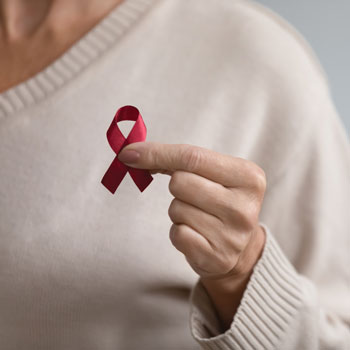Be mindful of menopause in women with HIV
As the population ages, menopause impacts HIV care, and vice versa.
The demographics of patients with HIV infection have changed over the past decades, with treatments improving and life expectancies lengthening.
This “silvering” of the epidemic, combined with a high representation of women among those impacted by HIV globally, has a natural consequence, according to Elizabeth King, MD, FRCPC, MHSc: It means more women with HIV going through menopause. At a talk at IDWeek, held in Los Angeles in October 2024, she gave three reasons for physicians to integrate menopause care into their HIV care toolkits, as well as advice on the best ways to do so.

The first reason Dr. King offered is that menopause impacts HIV care, and vice versa. Research has shown that women with HIV who have severe menopausal symptoms are less likely to take their antiretroviral (ARV) medications. One study, published in AIDS Care in January 2021, reported more than double the odds of suboptimal adherence in such patients.
On the flip side, for HIV's impact on menopause, “you need look no further than looking at drug-drug interactions,” said Dr. King, an assistant professor at Simon Fraser University in British Columbia and an infectious diseases physician specializing in women with HIV. ARVs often interact with menopause treatments, including hormone therapy, she said.
Another concern is how menopause impacts quality of life, Dr. King said. She pointed to a study published in February 2009 in Maturitas finding that menopause has negative effects on work in 46% of women, leisure in 48%, sleep in 82%, mood in 69%, and sexual activity in 41%. A study published in Women's Health in January 2022 found that severe menopausal symptoms were associated with reduced quality of life specifically in patients with HIV.
Finally, menopause impacts systemic health, Dr. King explained. Menopause is marked by hormonal decline, which accelerates age-related comorbidities, including increased central adiposity, higher insulin resistance, worse lipid profile, progressive atherosclerosis, and poorer bone health outcomes. “Now why is this important?” she said. “You probably recognize this list of age-related comorbidities because these are the comorbidities that we talk about a lot with both HIV and ARVs.”
Dr. King next discussed whether HIV status influences menopause. “There's been a lot of research on this, and the research has mainly focused on two questions: Does HIV change the age that women experience menopause, and does HIV change symptoms?” she said.
On the first question, studies over the past two decades have found that women living with HIV may experience menopause slightly earlier than those without, for example at 49 years versus 50 years in one study published in Viruses in April 2023. The literature also suggests a higher prevalence of early menopause, defined as menopause before age 45 years, and primary ovarian insufficiency in women living with HIV compared with the general population.
“This is something that I mentioned, and that it's important to be aware of, because these two entities are associated with worse health outcomes,” such as increased incidence of cardiovascular disease, dementia, fractures, and all-cause mortality, Dr. King said.
Regarding whether HIV affects menopausal symptoms, joint and muscle pains and aches are the most common symptoms related to menopause among both HIV-positive and HIV-negative women. “It's not vasomotor symptoms, believe it or not,” Dr. King said.
Studies examining whether women with HIV experience more menopausal symptoms than those without HIV have so far found no strong evidence. However, she noted that psychosocial and other variables, such as socioeconomic status, smoking and substance use, mental and physical health, trauma and chronic stress, and social supports, can also affect menopause symptoms.
“You can see that all of these factors as well could be experienced by women living with HIV and could intersect to influence their experiences,” Dr. King said.
Menopause symptoms can be managed with lifestyle changes, cognitive behavioral therapies, and vaginal estrogens, as well as menopause hormone therapy (MHT) and tibolone and nonhormonal medications such as selective serotonin reuptake inhibitors, gabapentin, and fezolinetant, Dr. King advised.
For secondary prevention of vasomotor symptoms, MHT is the guideline-recommended first-line option, but it has been controversial due to the Women's Health Initiative trial, published by JAMA in July 2002, finding an association between MHT and both cardiovascular disease and breast cancer. “That caused a precipitous drop in hormone therapy uptake that really hasn't recovered fully since that publication,” Dr. King said.
However, a follow-up study published in March 2016 by the New England Journal of Medicine found that the cardiovascular risk with MHT affected mostly those older than age 60 years who were more than 10 years into menopause.
“Because of that, they came up with a … hypothesis that if hormone therapy is given early on, it does not increase cardiovascular risk, and since [then], there's been some studies that have also demonstrated some cardiovascular protective effect,” Dr. King said. She also noted that while there is an increased risk of breast cancer associated with MHT, a study published by The Lancet in September 2019 found that the absolute risk is 2% over 20 years, or one in 50 women who use hormones.
For most women with vasomotor symptoms or early menopause, the best combination of MHT for secondary prevention is estrogen and progesterone. Women who have had a hysterectomy or who are using an intrauterine device for birth control can take estrogen alone, Dr. King said. She noted that transdermal estradiol carries the lowest risk for venous thromboembolism and is usually recommended over oral estradiol, and micronized progesterone is preferred because it carries the lowest risk for breast cancer.
After selecting a potential menopause therapy, “you then want to check for contraindications, discuss risks and benefits, and enter into a shared care decision-making model,” Dr. King said. “And for women living with HIV, particularly, you want to make sure that there's no drug-drug interactions.”
The primary drugs to be concerned about are non-nucleoside reverse transcriptase inhibitors (NNRTIs) and boosted regimens, according to Dr. King. “NNRTIs and anything with a booster have the potential to interact,” she said. “But I will say that the interactions don't contraindicate giving MHT. They just mean that you need to be aware of how the interaction is going to affect your hormone therapy and adjust the dosing accordingly.”
Dr. King next discussed the effect of ARVs and hormones on comorbid conditions in midlife women with HIV. “In terms of risk profiles, cardiovascular disease is, of course, a really important risk for women living with HIV,” she said. “Menopause is important because it accelerates that risk, and vasomotor symptoms of menopause are also associated with increased cardiovascular disease risk.”
The landmark trial REPRIEVE (Randomized Trial to Prevent Vascular Events in HIV), published in the New England Journal of Medicine in July 2023, found that while women with HIV had lower baseline levels of cardiovascular plaque than men, they also had a different immune activation profile and different levels of immune inflammatory markers (e.g., higher levels of IL-6 and high-sensitivity C-reactive protein and D-dimer, lower levels of lipoprotein-associated phospholipase).
Statins for primary prevention benefited both sexes equally. “I think that this is really important, because women traditionally are considered to be of lower cardiovascular risk, but in REPRIEVE, they benefited just as much from statins as men,” Dr. King said.
The trial also assessed how cardiovascular risk calculators perform in men and women with HIV. While event rates for cardiovascular disease were similar in both men and women in low-risk groups, the higher-risk groups had much higher event rates for women in each of the different risk stratification categories, Dr. King reported.
“They also … looked at the predictive value of these prediction tools, and they found that women's risk was underestimated in about 42%,” she said. “This is just something to keep in mind, and something that we need further research on to have better tools that are tailored to women's health.”
Dr. King closed her talk by covering the topic of weight gain. “This has been coming up a lot in HIV conferences, especially INSTI [integrase strand transfer inhibitor]-related weight gain, and unfortunately for us women, menopause does bring on weight gain on average,” she said.
She noted that one unresolved question has been whether the tendency to gain weight during the menopause transition influences the weight gain seen with INSTI therapy. A retrospective cohort study presented at the Conferences on Retroviruses and Opportunistic Infections in March 2024 attempted to provide some answers, Dr. King said. Researchers compared changes in body mass index (BMI) and waist circumference during premenopause, perimenopause, and postmenopause in 424 women with HIV who had switched to an INSTI, 735 women with HIV who had not switched, and 904 women without HIV. They found that women who were in perimenopause and menopause had a much higher increase in BMI and waist circumference than those who were premenopausal.
These results should be considered when making treatment decisions in clinical practice, according to Dr. King.
“I think that these findings are quite alarming, and they do give me pause when I'm thinking about different regimens for women and whether to do an INSTI switch during the perimenopausal transition,” she said, “particularly if women already suffer from other metabolic risk factors.”




